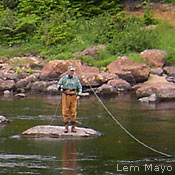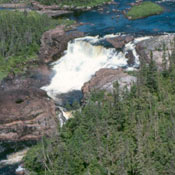
Newfoundland and Labrador are home to two Canadian Heritage Rivers – the Main River, and the Bay du Nord River.
Main River Canadian Heritage River

Newfoundland and Labrador’s first Heritage River – the Main River – received its designation in 2001. Located at the base of the Island’s Great Northern Peninsula, the Main River winds through old-growth forest and the rich plant- and wildlife of the “Big Steady” before plunging down to the sea. It provides, by turns, placid tranquility and thrilling white-water canoeing.
Learn more about the Main River.
Bay du Nord Canadian Heritage River

The Bay du Nord River system was nominated in 1992, designated in 2005 and is the province’s second Canadian Heritage River. Flowing through the pristine landscape of the Bay du Nord Wilderness Reserve, it sweeps paddlers past wide barrens where caribou roam, through whitewater “rattles” and quiet pools where countless brook trout, landlocked salmon, and Atlantic salmon swim, then down to the salt waters of Fortune Bay on Newfoundland’s south coast.
Learn more about the Bay du Nord River.
The Canadian Heritage River System
The Canadian Heritage Rivers System was established in 1984 to conserve and protect the best examples of Canada’s river heritage, to give special rivers national recognition, and to encourage the public to enjoy and appreciate them.
As of 2021, 40 rivers across the country known for their natural, recreational, and cultural significance have been designated as Canadian Heritage Rivers.
The Canadian Heritage River System (CHRS) is a public trust. Local citizens and grass-roots involvement move its programs forward. Communities, Indigenous peoples, landowners, and stakeholders have their rights and concerns respected. Governments are responsible for designation, as well as lending support and guidance, and providing approvals and protection as required.
The CHRS is administered by the Canadian Heritage Rivers Board. Its members are appointed by the federal, provincial, and territorial governments. The CHRS has no legislative authority-it is driven by voluntary participation, partnerships, cooperation, and community involvement.
Learn more about the Canadian Heritage River System.
